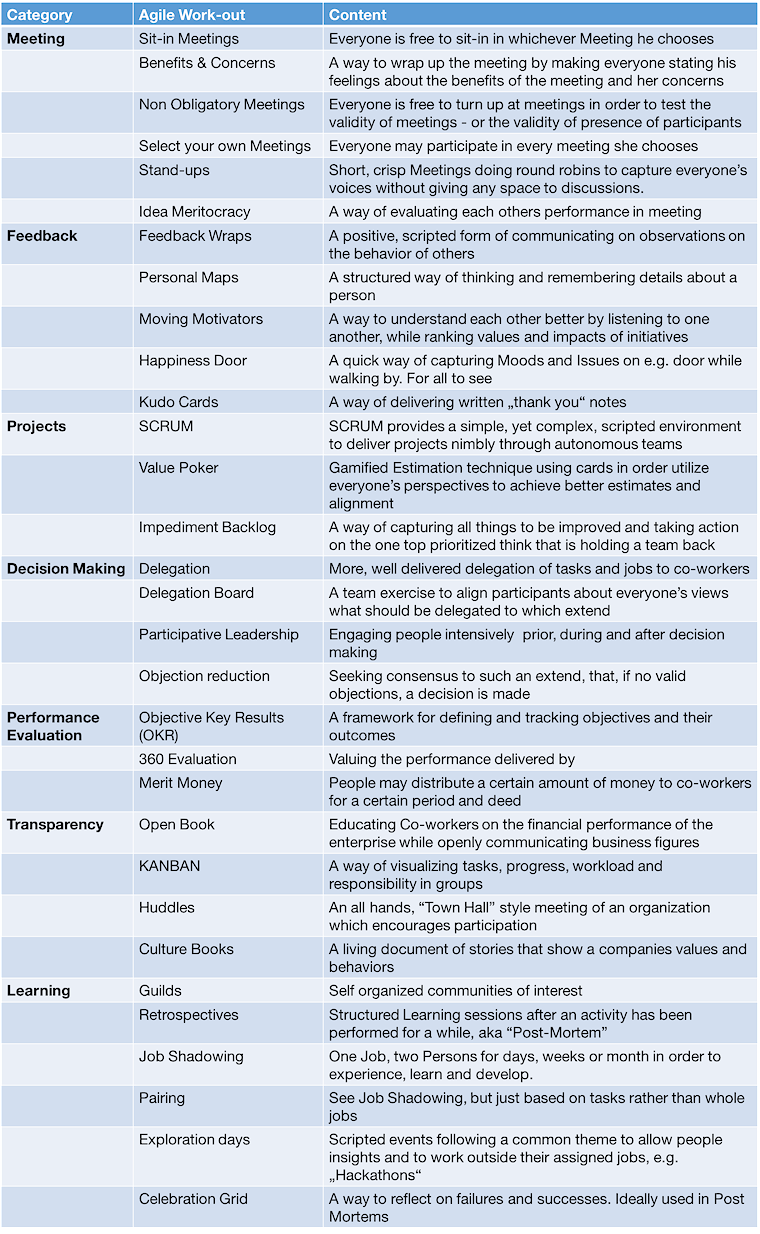Adopting Self-Management: Big Bang Or Baby Steps?

As I waded deeper into the sea of knowledge on self-management, I recognized a clash of opinions on how to adopt it. On the one side are the purists, who claim that only a big bang will do. Otherwise, the hierarchy will pervade and undermine self-managed structures over time, thereby re-establishing itself and making a mockery of the whole exercise.
On the other side are the pragmatists who, while agreeing that such a revolution would be great, think it is utterly unrealistic. Instead, they want to work from inside the (hierarchical) system and get it to gradually release its grip. This blog post is an exploration of both views.
Baby steps: agile work-outs
The baby steps method is doing agile work-outs, as single, more or less stand-alone exercises: like improving delegation, running Scrum projects, reshuffling office space, etc. Agile work-outs are small, practical ways of collaborating in teams. Here is a list of examples.

More on agile exercises can be found at Liberating Structures.
Small steps can have significant impacts. When done deliberately and repeatedly, they can shape behaviors. These behaviors then become a personal habit. That’s basic coaching theory.
So why not use this reputable mechanism to shape organizations as well? Surely, what works with individuals and groups can work with organizations, too?
Or, maybe not. Organizations are different. They contain so many players they can become impersonal. They have what academics call “emergent” properties: they have characteristics and behaviors that can not be observed in the individual components (people). Even teams have emergent properties. But in big organizations, they are magnified.
In groups, you get clues - visual, verbal and other - about the effect of a particular decision from your teammates. In organizations, the feedback mechanisms may be weak or non-existent. Who knows what the guys in the next building are doing?
It takes a lot of effort, often nothing less than a major crisis, to prompt an organization to change. Chances are that agile work-outs:
- will be co-opted by the hierarchy and management – and result in nothing but lip-service. A lay theatrical performance;
- are adopted in a random, nonsensical manner – and simply add to the Corporate Gimmickry Score;
- will be of limited use, especially if the organization operates on a “need to know basis” - and fail to give workers any context;
- will be of limited use, if there is no mission providing a “true north” to signal to employees what they should contribute, and – shock – why they should engage at all;
- will be useless, if there is no safe place to express criticism or – God forbid – feelings.
Without a focal point for action (a clear “Schwerpunkt” as we would say in Germany), agile work-outs may just be a passing corporate fad. People will likely grow disillusioned, tired and plain weary of them.
Big bang: revolutionary designs
If hierarchical organizations are so resistant to change, you can’t change them by evolution. Nothing short of a revolution will suffice. Down with the hierarchy! Down with the caste of managers! Down with the tyranny that turns adults into kids the moment they enter the office!
This is the view of many seasoned veterans of the self-management movement - like Brian Robertson or Koldo Saratxaga. Adopting self-management is painful. The hierarchy is likely to re-establish itself if the transfer of power is not carried out decisively, and by the owner.
A successful rebellion needs a plan. Holacracy provides such a plan. It provides an “operating system” to replace the workings of the hierarchy, and it determines the roles workers settle into. Another script for the start of a rebellion is provided by the Spanish consultancy K2K Emoncionado
Besides the pain of such a radical step, the primary challenge is this: How on earth can any sizeable number of owners ever summon this much egalitarian resolve to abdicate their powers to workers? Yet, there are more and more cases of owners doing just that. The Corporate Rebels are reporting on such cases.
Do not get me wrong: I absolutely think there is a huge economic and humanitarian case to move boldly to self-management. But I fear that if we wait for more bold and enlightened owners to turn over control, the rebellion won’t scale. In which case, self-management will remain a curious sideshow on a stage dominated by sclerotic companies dedicated to the status quo, and to exploitation.
Conclusion

I can see the logic in the “Baby Step” and in the “Big Bang” approaches. But I do think that neither the pragmatists nor the purists do offer a viable route for established organizations to move towards self-management:
- The Baby Steps approach will properly not get anywherein any reasonable amount of time. It will likely fade over time as just another set of corporate gimmicks that have been tried and forgotten.
- The Big Bang approach will remain niche: No matter how high the demand, the supply side of the market for enlightened owners is very slim. There are very few people willing to go all-out for self-management. Most will need more convincing. They need a way to figure out self-management in controlled pilots and experiments.
--------------------------------------------------
This guest blog is written by Frank Thun. Frank writes for his blog ManagementDigital.net on unconventional management practices. He describes how they release creativity and learning, and how they allow people to truly commit.

